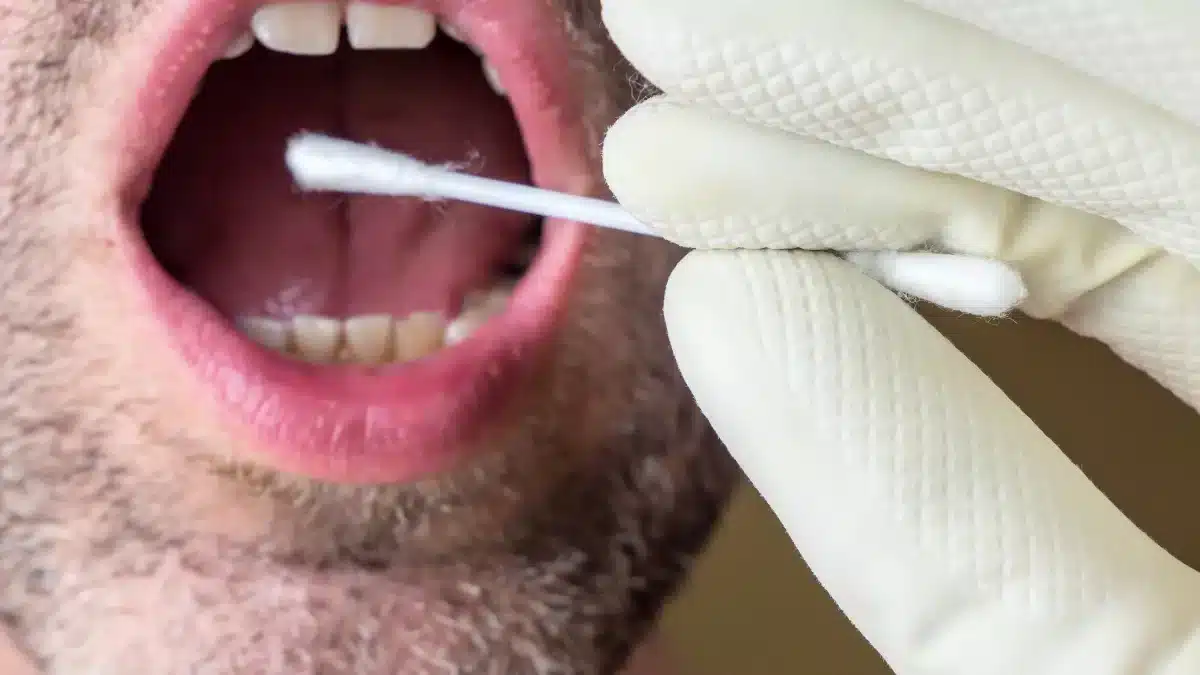Unveiling Myth About HIV Transmission: Can You Get HIV From Saliva?
Human Immunodeficiency Virus (HIV) can be detected in blood and body fluids, including saliva, semen, and vaginal fluid, and can be transmitted through genital sexual intercourse.
However, the risk of transmission of HIV through oral sexual practice or saliva is less likely to happen.
Unlike other mucosal areas of the body, the oral region is the most uncommon route for HIV transmission.
But why is saliva not the medium for the transmission of HIV, and what distinguishes saliva from other body fluids that transmit HIV infection?
This comprehensive article will elaborate on the important question ‘Can you get HIV from saliva?’ and what other ways HIV is not transmitted.
So, let’s delve into the topic and learn in detail.
Can you get HIV/AIDS from saliva
If you wonder whether you can acquire or transmit an HIV infection by mere kissing or spitting, the answer is no.
An infected person can not transmit HIV/AIDS through saliva to a healthy person.
The saliva of an infected person usually contains a non-infectious component of HIV that indicates the possible breakdown or inactivation of the infectious HIV.
Only 1% to 5% of people contain infectious HIV in their saliva, though it is present in their blood.
The percentage can go as high as 20% in mucosal surfaces, such as vaginal and seminal fluids.
However, for HIV to be transmitted, the HIV of the following fluids must get into the bloodstream of an HIV-negative person through a mucous membrane:
- Blood
- Semen and precum
- Vaginal fluid
- Breast milk
- Rectal fluid
The mucous membranes through which HIV is transmitted include the vagina, rectum, tip of the penis and mouth.
Further, it can be transmitted through infected syringes, open cuts, or sores.
However, there is no evidence of transmission of HIV through saliva.
How mouth transmits HIV

HIV can be transmitted through the mouth in the following two cases:
- Being bitten by a person with HIV: In rare cases, there are some chances for the transmission of HIV by human bites if saliva is mixed with blood
- Through kissing with open cuts: It can also be transmitted with deep, open-mouth kisses with sores and bleeding gums between an infected and non-infected person
These two cases cause the transmission of HIV through blood from an HIV-positive person to an HIV-negative individual.
Still, there is no evidence of HIV transmission by saliva.
Why does saliva rarely transmit HIV
As per an NCBI report, most of the infectious HIV is found in, produced by, and transmitted by infected mononuclear leucocytes (macrophages and lymphocytes).
Saliva, on the other hand, is hypotonic.
Hypotonic disruption can be a major mechanism by which saliva kills the infected mononuclear leucocytes and inhibits their multiplication and transmission.
Saliva can disrupt 90% or more infected mononuclear leucocytes and inhibit the multiplication of HIV by 10000 folds.
Also, according to another NCBI report, people with HIV often have oral lesions that can cause bleeding and, thus, release the virus in the oral cavity.
Further, viral p24 and HIV-1 RNA were also identified in tonsils and adenoids, even in asymptomatic seropositive people.
Although HIV-1 and HIV-DNA are detected in saliva, still, the risk of HIV infectivity is very low.
There can be certain factors in the saliva that inhibit HIV-1 infectivity.
The anti-HIV activities in the saliva are as follows:
- The physical entrapment (being trapped) of HIV by high molecular weight molecules, such as mucins
- Inhibition of viral infection by soluble salivary proteins, such as recombinant Secretory Leucocyte Protease Inhibitors (rSLPI)
The anti-HIV activity of rSLPI is due to its interaction with the cell surface molecules other than primary HIV-1 receptor CD4 (T-lymphocytes).
How HIV is not transmitted

It is important to note that HIV is not a common cold or flu and can only be transmitted through specific body fluids.
There are also some other ways through which HIV infection is not transmitted, such as:
- Air or water
- Saliva, tears, sweat, feces, and urine without infected blood
- Mosquitoes, ticks, and other insects
- Hugging, touching, shaking hands and toilets, kissing and sharing food
However, if you suspect any serious symptoms of HIV, consult a healthcare practitioner and seek prompt medical attention for a faster recovery.
Conclusion
HIV transmission through saliva is less likely to happen.
It can only be transmitted by mouth if an infected person bites a healthy person and blood is mixed with saliva or deep open kisses with bleeding gums.
Saliva is hypotonic and may kill 90% or more infected mononuclear leucocytes and inhibit HIV multiplication.
Further, recombinant Secretory Leucocyte Protease Inhibitors (rSLPI) can inhibit viral infection and prevent its transmission.
With saliva, there are also other ways through which HIV cannot be transmitted, such as air, water hugging, and shaking hands.
However, if you suspect any serious symptoms of HIV, consult a healthcare practitioner and seek prompt medical attention for faster recovery.
Frequently Asked Questions
Can AIDS be transmitted through saliva?
No, HIV/AIDS cannot be transmitted through the saliva of an infected person to a healthy person. Saliva is a hypotonic medium. Thus, it may kill the infected mononuclear leucocytes and inhibit HIV multiplication by 10000 folds and transmission.
Can you get HIV from oral saliva?
No, the chances of getting an HIV infection through kissing and saliva are less likely. Saliva is a hypotonic medium and may kill the infected mononuclear leucocytes. Thus, saliva can inhibit the multiplication and transmission of HIV. Further, saliva has certain Protease Inhibitors that can inhibit viral infection.
Can HIV spread through saliva?
No, HIV cannot be spread through saliva. Saliva has certain proteins that can inhibit the multiplication and transmission of HIV. However, HIV can be transmitted in the case of human bites that involve the mixing of infected blood with saliva and kissing with deep-open cuts, sores, and bleeding gums.
Can HIV be transmitted through saliva to an open wound?
Yes, there are some chances that HIV can be transmitted through an open wound when saliva mixes with blood. It can be transmitted with deep, open-mouth kissing with sores and bleeding gums between an HIV-positive and HIV-negative person. You should consult a healthcare practitioner and seek prompt medical attention.
WowRx uses only high-quality sources while writing our articles. Please read our content information policy to know more about how we keep our content reliable and trustworthy.






